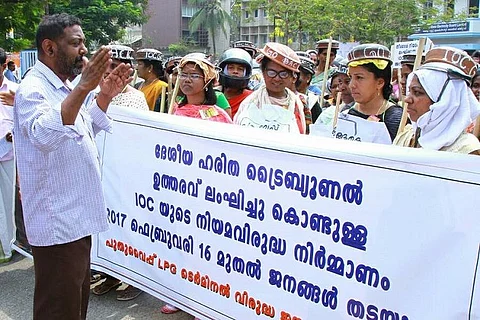

“Everywhere people who traditionally belong to a habitat initially resist as much as they can against the harmful changes to their environment in the name of development. But finally, the giants win, and they encroach on the habitats, pull down our hills, they dump poison in our water bodies and hijack our beaches and resources,” says Thankappan, a fisherman from Puthuvype.
Thankappan, and over 500 other families of Puthuvype island are engaged in a pitched battle against the Indian Oil Corporation (IOCL), which is building a large cooking gas import terminal there.
The terminal, which will store large amounts of LPG for distribution across Kerala, Tamil and Kerala, was first proposed in 2009, with construction beginning at the end of 2012. However, work on the terminal has been much delayed due to various issues.
In February, Thankappan and his fellow island residents achieved a partial victory with IOCL suspending all construction following their protests. However, the locals have resolved to continue their agitation until IOC pulls out of the project entirely. The indefinite agitation reached its 65th day on Saturday.
Those opposing the terminal say that their concerns are on grounds of both environmental and safety considerations. The proposed IOCL LPG plant will have the capacity to store 15.47 TMT (thousand metric tonnes) of LPG, and residents question the wisdom of storing such large quantities of combustible material within an inhabitated area, populated by almost 65,000 people.
“This is the only place in the world such a huge terminal that stores such a high amount of LPG comes up in a highly populated area, where almost 65000 people live. This terminal is just 30 metres away from the houses here. This will result in a huge tragedy,” says Ajay Ghosh, Convenor, LPG Terminal Virudha Janakeeya Samara Samithi.
If leaks, ruptures or accidents occur in the plant, they argue, it could lead to a disaster in such a populated area. Even small leaks would cause a lot of inconvenience for residents in the area, they point out. “Restrictions will be imposed among the residents even if there will be a small leakage. Till that leakage is rectified residents will not be even allowed to use electricity,” Ajay says.
He adds that residents and activists are also worried about the presence of large quantities of mercaptans, the odourisers used to give LPG its characteristic smell that can be toxic in large quantities. “LPG will be filled in around 500 tankers on daily basis here. The residents will breathe in mercaptans daily. As far as we know it is a toxic gas,” he says.
However, in a February press release, IOCL dismissed these concerns, and stated that international safety standards would be followed in the plant. “The LPG storage tanks will be in the form of 'Mounded Bullets' which is the safest method of storage of LPG worldwide. The tanks are covered by reinforced cement concrete walls on all the sides. IOCL adopts global standards of safety across all its projects,” the media statement said.
But it’s not just safety concerns that occupy the residents of Puthuvype island. They also allege that the plant violates environmental regulations and robs them of their livelihoods.
Between the fishing community’s inhabitation and the beachfront runs a tarred road that forms the dividing line. On the other side lie hectares of land along the beach that was owned by the Cochin Port Trust. A significant portion, however, has been sold off to the Bharat Petroleum Corporation Limited, the Kochi LNG Terminal and so on.
The fishing community living across the road says that so far it has had no choice but to watch its beaches sold off to many big companies.
“All the constructions by them were on marshy land, which badly affects the area’s environmental balance. As per the CRZ rule any construction can only be allowed 200 metres away from the high tide line. IOCL has broken all those rules, and they built a huge wall by placing big rocks, taking over a big portion of the seashore,” Biju, one of the protestors alleges.
The local fishermen allege that each new construction that comes up along the shoreline places new restrictions on them, prohibiting fishing in nearby areas of the sea. They allege that these companies have slowly closed up local access to the sea. “So, when this terminal comes, we will not be allowed to fish anywhere nearby. Then where will these small-scale fishermen go for fishing,” asks Latha one of the residents.
Ajay argues that the land historically belongs to the fishing community, and alleges that the companies are trying to evict them without visibly acquiring the land. “Land acquisition will be a huge issue for them. But when these companies come, people will themselves sell off their land and leave from here due to difficulties. Then they can acquire these poor people’s lands,” he said.
In its February statement, IOCL had claimed that its project would generate revenue for the state and employment for the local population.
"The state government is expected to earn an additional tax revenue of around Rs 150 crore per annum. The entire project construction work will provide employment to over 300 people. The project will also bring in livelihood opportunities to scores of local residents,” the statement said.
However, locals are deeply suspicious of opportunities offered by IOCL thus far, calling them attempts to buy their silence.
“In the beginning, they told us they will build a park for us, they will give us free ration and also will employ us in the company with a high income. When they built this wall they called a few locals for the construction, and even if they did not have any work they paid them a huge amount as daily wages. Some of them even got Rs 1500 a day as wages. Within no time we understood that these were all their tricks to keep our mouth shut,” said Rajan another local fisherman.